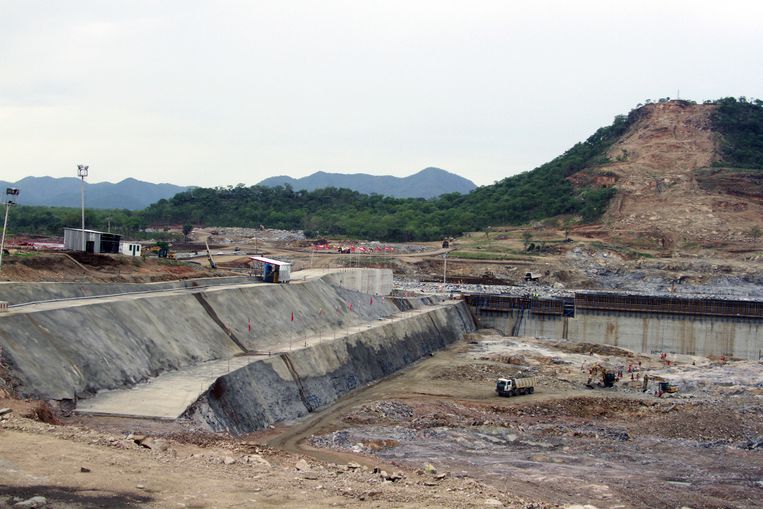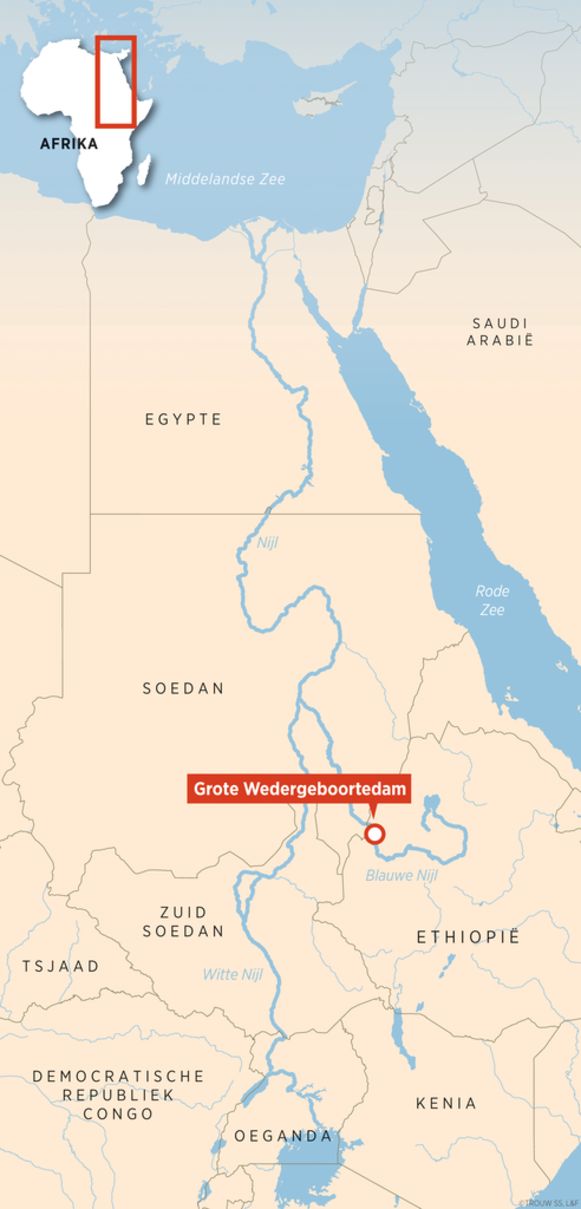
The Nile is perhaps the most famous river in the world, source of civilization and prosperity – and now also of a regional conflict: Ethiopia builds a huge dam along its border with Sudan, which according to Egypt is stopped much water from the Nile, with possible disastrous consequences.
Egypt and Ethiopia have been fighting for years about the right to use water on the Blue Nile. It starts in Ethiopia, meets in Sudan with the White Nile and then continues as Nile via Egypt and finally ends in the Mediterranean Sea. Ethiopia had been planning a dam for a long time, but it was postponing the construction, partly due to internal problems, such as the economy and political instability, but in 2011 the country finally started the project, to the great anger of Egypt.
According to the North African country, the Great Rebirth Dam constitutes an existential danger. The Egyptian president Anwar Sadat, who had previously waged war against Israel, swore in 1979 war as a political coercive, but made a single exception: “The only issue that can bring Egypt to war is water”. His successor, Hosni Mubarak, once proposed to blow up the dam via an air raid or to support rebels against the Ethiopian government, if Ethiopia would start the dam project.
That the issue is sensitive in Egypt, also confirms the Egyptian professor of water policy Hani Sewilam of the American University of Cairo. He even wants to answer questions by email only, in order to ‘exclude misunderstandings’.
Sewilam is also very concerned about the Ethiopian project and its consequences for his country. A small break from the river can already turn out to be serious, he says. “Egypt is 97 percent dependent on the river for its water requirements, and the remaining 3 percent is absorbed by the low rainfall and groundwater (including in the Sinai desert, ed.).”
© AFP
Egypt can not afford to interrupt the water supply, according to Sewilam, because the current situation is already untenable. Egypt is considered ‘water scarcer’ and is now approaching the danger zone. The construction of a dam in Ethiopia that stops the water to Egypt means, according to Sewilam, a ‘serious threat to the flood risk management of Egypt’ and thus to the country.
What worries him the most is the location and size of the Ethiopian project: “The Blue Nile provides the Nile with 85% of its water.” Normally, building a dam for energy generation would not be a problem, because the water can be used by the downstream countries. Sudan and Egypt still reach, but the construction of such a huge dam, with a reservoir of 74 billion cubic meters, can in theory store as much water as what Sudan and Egypt use in a year. ” In addition, a lot of water will be lost due to ‘evaporation and leakage’, he fears. “I fully understand the right of other countries to develop, but not at the expense of Egyptian lives, the only thing that is developing now is the construction of the huge dam.”
Sewilam is looking for the solution in more cooperation. Egypt has a lot of knowledge and can help Ethiopia to absorb more rainwater. This ultimately benefits all countries around the Nile, according to the Egyptian: “If we consider Nile countries as a unit, then there is enough water, energy and food for everyone.”
The government in Cairo is less lenient in the conflict with Ethiopia. Egypt often refers to the international convention on the use of water resources, which requires states to use them in a ‘fair and fair way’ and to ‘take all possible steps to prevent serious damage’ to other countries. Ethiopia can build a dam, as long as it does not damage Egypt.
In addition, Egypt points to a treaty from 1902 between Ethiopia and Great Britain (the then ruler in Egypt), whereby it was agreed that Ethiopia would not take any action that would interrupt the supply of Nile water. According to Egypt, the construction of the Great Rebirth Dam is a violation of the treaty. In addition, Egypt refers to treaties from 1929 and 1959, which were concluded between Egypt and Sudan, in which the use of Nile water is regulated.
If international law is violated by Ethiopia, according to several Egyptian governments, Egypt reserves the right to military intervention. In 2010, Egypt and Sudan discussed the possibility of blowing up the dam, if necessary. An Egyptian government official then wrote to a Sudanese colleague: ‘If it comes to a crisis, we will send a jet fighter to simply bomb the dam, or we can send commands to sabotage the dam’. In 2013, the then Egyptian president Mohammed Morsi also considered sabotaging the dam or supporting rebels against the government in Ethiopia to stop the construction of the dam.

“Ethiopia is entering a new era, one of industrialization and growth, so Ethiopia needs energy, and in our country we have a big electricity shortage, which is why we decided to build the dam.”
In addition, the water will not be used for irrigation, says Arsano. Cairo fears that Ethiopia will also use the water from the dam for agriculture so that the water shortage will increase even further. The Egyptians point to the size of the dam, which according to them is far too large for the generation of energy alone.
Remarkably, Ethiopia has so far hardly used the Blue Nile water – according to some studies, Ethiopia uses less than one percent of the river water – despite the many droughts and famines that plagued the country. For a country with more than 95 million people, the Blue Nile water could mean a lot.
Arsano says Egypt does not have to worry. “The land around the Great Rebirth dam is hardly suitable for agriculture, and the soil is unusable.” Of course people will also use the water, but the amount is negligible. Really, do not worry, once the dam is filled, the river will flow as before. “
But what about the bridging period? According to Arsano, Egypt does not have to worry about this either. “Of course there will be an impact.” All dams have consequences, but Ethiopia is a responsible country, we are not going to let the dam flood in one go, but in stages, it is only after three years that the dam is full, partly because of the consequences for Egypt. to limit.”
According to Arsano, Egypt can help itself to reduce the impact. “Egypt built the Aswan dam in the sixties, where a lot of water is stored in. When Ethiopia fills the Rebirth dam, the Egyptians can use the water from their own reservoir to fill the deficit. to suffer.”
That Egypt is afraid that the Rebirth dam led to evaporation of Nile water is, according to Arsano, also misplaced. “If the water evaporates in the Great Rebirth Dam, then also in the Aswan Dam, so Egypt should start mostly on its own, and Egypt will lose a lot of precious water because they will deal negligently with the Nile Water, due in part to their waste water system and the incorrect application of irrigation techniques. . “
The international treaties to which Egypt refers are, according to Arsano, in the worst case invalid and in the best superfluous. “The treaty between Great Britain and Ethiopia from 1902 states that Ethiopia will not use the Nile in a way that damages other countries, Ethiopia will not, and the river will continue to flow.” The 1959 treaty between Egypt and Sudan, in which they dividing the Nile is invalid. Ethiopia was not a party to that treaty, so it is not binding on us, and if it had been binding it would be unjust and invalid. Egypt and Sudan have according to their mutual treaties complete domination over all the Nile water, this position is misplaced, you can not usurp other people’s water, which is a violation of all sovereignty.
“So the solution is simple: Egypt needs to make more use of its own water supply, we take our neighbors into account, and if necessary help them to reduce the damage, we will all benefit from the development of the Nile. keep our heads cool and find the solution in science and diplomacy, as we will always be each other’s neighbors. “
